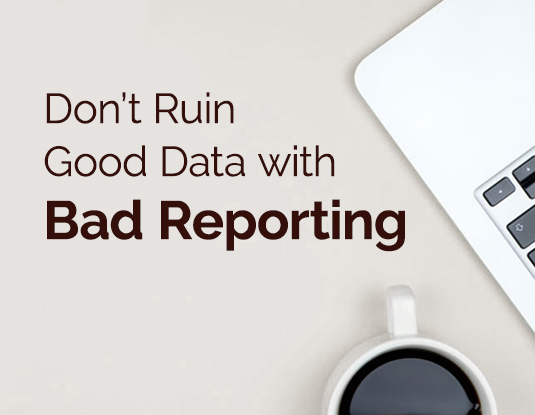If you have an article, marketing tip or thoughts you'd like to share, drop us a line at
deccatalkingpoints@decdesign.com
deccatalkingpoints@decdesign.com
Don’t Ruin Good Data with Bad Reporting

We live in a world of data. However, to extract value from that data we must compile it, analyze it, and report what we learn. Reports often fail to deliver critical insights or, worse, go unread. Follow the seven reporting habits below to help produce valuable reports and transform data into an insightful story.
- Know your goals
By stating your goals, what you’re measuring and what you learn becomes clearer. Just make sure you don’t focus on volume-based metrics—like impressions and followers—which don’t translate to business value.
- Map metrics to your goals
You can’t always get the exact data you need. So instead, determine what data you can extract that gets you closer to your goal. You can’t measure viewer interest in content. But you can measure “time spent on page” to indicate interest.
- Streamline your data
Make sure you are working with clean and accurate data. Monitor any links, page actions, and events you are tracking and apply appropriate spam filters when necessary.
- Explain anomalies and trends
It’s never enough to simply show the “what.” You must also explain the “why.” If you observe a sudden spike or dip, or detect a trend, you should explain what’s driving those results in your report.
- Get visual
Consider how you display each result in your report. Visual charts and graphs have more impact than data tables. Look for ways to combine related data points within one chart to show relationships and correlations.
- Include relevant details
Communicating results often requires context. Your audience needs to know what you measured, why it matters, and whether the results are good. So, define your metrics and include benchmarks to help your audience understand what they’re seeing.
- Consider the future
Reports help us look back to see what happened. But we still need to apply what we learn in order to improve. Each reporting cycle should deliver insight about what is or isn’t working and include a plan for applying this new knowledge.
You’ve likely heard the expression “if it’s worth doing, it’s worth doing well.” Well, it applies here. Building up your reporting muscles lets you deliver effective reports with deeper insights and, ultimately, better programs and positive outcomes.
Based on From Data to Actionable Intelligence: How Not to Sabotage Good Data With Bad Reporting by Jennifer Scheer.
